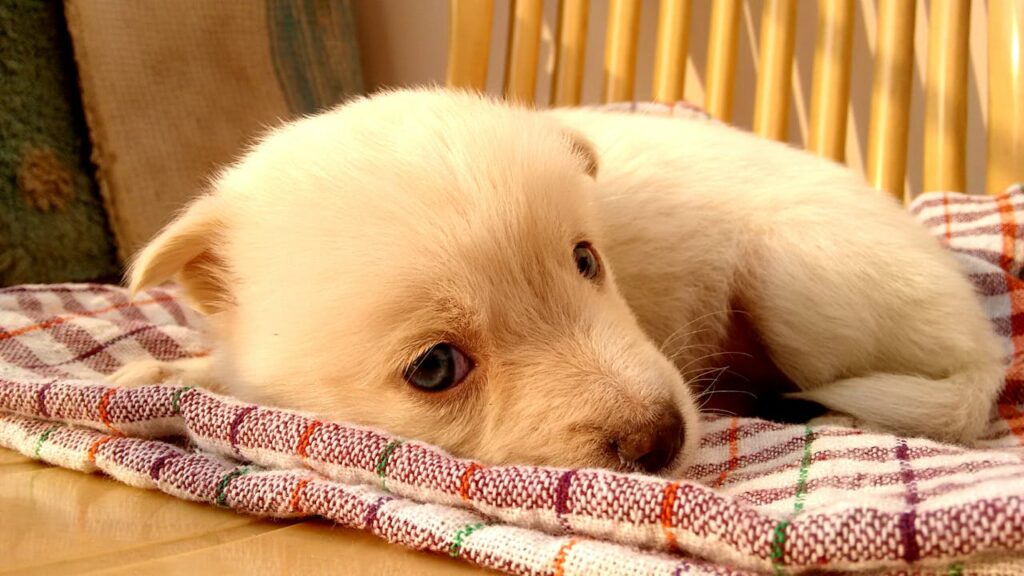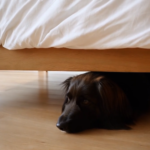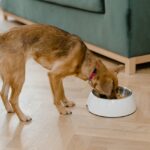As a puppy parent, it’s worrying to see your little one struggling with diarrhea, especially at night. You might wonder, why is my puppy having diarrhea at night?
It’s a common concern, but it’s important to understand that there are several possible reasons behind it.
In this article, let me explore the causes, signs to watch out for, and steps you can take to help your puppy feel better.
Common Causes of Diarrhea in Puppies
Dietary Issues
One of the most common reasons puppies get diarrhea is diet-related. If you’ve recently switched your puppy’s food or added new treats, their stomach might not be able to handle the change.
Puppies have sensitive tummies, and sudden changes can lead to upset stomachs and diarrhea, especially at night when their digestive system slows down.
Overfeeding is another issue. Puppies are often fed too much food too quickly, which can overwhelm their digestive system.
It’s also important to consider whether your puppy has food allergies or intolerances. Common allergens like chicken, beef, or dairy can cause gastrointestinal issues.
Parasites and Infections
Parasites are another reason why your puppy might be having diarrhea at night. Intestinal worms like roundworms or hookworms are common in puppies.
Infections caused by bacteria or viruses, such as parvovirus or salmonella, can also lead to diarrhea.
If your puppy’s diarrhea is frequent, watery, or accompanied by other symptoms like vomiting, it could be due to an infection, and it’s important to consult your vet right away.
Stress and Anxiety
Stress can have a big impact on your puppy’s digestion. Puppies often experience anxiety when separated from their owners, especially at night when everything is quiet.
This anxiety can cause diarrhea as a physical response to stress. If you’ve recently moved to a new home or if your puppy is adjusting to a new routine, stress might be the culprit.
Overeating or Eating Something Inappropriate
Puppies are naturally curious and may eat things they shouldn’t such as trash, plants, or human food.
Eating something inappropriate can upset their stomach and lead to diarrhea. If your puppy is having diarrhea after scavenging, this might be the cause.
Why Does Diarrhea Occur More Often at Night?
You may wonder why diarrhea seems to happen more at night. Here’s why:
Circadian Rhythms and Digestion
Your puppy’s body follows a natural sleep-wake cycle, or circadian rhythm. This rhythm influences many bodily functions, including digestion.
As your puppy’s body prepares to rest, digestive processes can slow down, which might make symptoms of diarrhea more noticeable when your puppy settles in for the night.
Less Distraction, More Observation
During the day, your puppy is usually active and distracted, and you might not notice the signs of diarrhea.
At night, when things quiet down, you’re more likely to notice if your puppy is uncomfortable or has an upset stomach.
Food Digestion Timing
If you’ve fed your puppy later in the day, digestion may not be completed by bedtime, and this can lead to nighttime diarrhea.
The body may also struggle to process food that’s heavy or hard to digest when your puppy is lying down to sleep.
Signs to Watch For and When to Seek Veterinary Help
If your puppy’s diarrhea is mild and lasts only a short time, it might not be an emergency. However, there are certain signs that should raise a red flag.
If your puppy shows any of the following, it’s time to call the vet:
Signs of Dehydration
Diarrhea can quickly lead to dehydration, especially in puppies. Keep an eye out for dry gums, lethargy, or a decrease in your puppy’s usual activity level. If your puppy isn’t drinking water or seems excessively tired, take action immediately.
Blood or Mucus in Stool
If you notice blood or mucus in your puppy’s stool, it’s a warning sign that something more serious is going on. This could be a sign of a bacterial infection or even a viral illness, like parvovirus.
Chronic or Severe Diarrhea
If diarrhea lasts more than 24-48 hours or worsens despite home care, it’s time to seek veterinary advice. Prolonged diarrhea can lead to malnutrition or dehydration, so don’t wait too long.
Other Symptoms
If your puppy has diarrhea along with vomiting, a fever, or changes in behavior, these could be signs of a more serious illness and require immediate veterinary attention.
How to Treat and Manage Puppy Diarrhea at Night
Dietary Adjustments
If your puppy is having diarrhea at night, start by adjusting their diet. A bland diet of boiled chicken and rice is often recommended for dogs with upset stomachs.
This is gentle on their digestive system and can help firm up their stool. Gradually reintroduce their regular food once they’ve improved.
Hydration is Key
Puppies with diarrhea can easily become dehydrated. Always ensure that fresh water is available, and encourage your puppy to drink.
You can also offer an electrolyte solution specifically designed for pets to help replenish lost fluids.
Probiotics and Supplements
Consider giving your puppy probiotics to restore balance to their gut microbiome. Probiotics help to support digestion and can be especially beneficial if your puppy has had an upset stomach for a few days.
Anti-Parasitic Medications
If parasites are suspected, your vet may prescribe deworming treatments to clear out any intestinal worms.
In some cases, antibiotics may be necessary if an infection is identified.
Consult Your Vet
If your puppy’s diarrhea persists or worsens, don’t hesitate to contact your veterinarian. They may perform a fecal exam, blood tests, or other diagnostic procedures to find out the underlying cause and recommend the best course of treatment.
Preventing Future Episodes of Nighttime Diarrhea
Stick to a Feeding Schedule
Regular feeding times help regulate your puppy’s digestive system. Avoid feeding your puppy too late at night, as this can lead to digestive issues before bedtime.
Transition Foods Slowly
If you need to change your puppy’s food, always do it gradually. Mix the new food with their old food over the course of 7-10 days to avoid upsetting their stomach.
Watch What Your Puppy Eats
Make sure to keep potentially harmful foods or substances out of your puppy’s reach. Puppies often explore with their mouths, so be cautious of toxic plants, chemicals, or human foods that could lead to digestive problems.
Manage Stress and Anxiety
To help reduce anxiety-related diarrhea, create a calm and comfortable space for your puppy to sleep. Use calming aids like a soft bed, a familiar blanket, or even gentle background noise to ease their nerves.
You may also like to read:
Why does a dog go under bed?
My dog has a runny nose.
Final Words
So, why is my puppy having diarrhea at night? It could be due to diet, stress, parasites, or even a case of overeating.
While occasional diarrhea isn’t always a cause for alarm, it’s important to monitor your puppy’s symptoms closely.
If the diarrhea persists or is accompanied by other concerning signs, consult your vet right away.
By making adjustments to their diet, managing their stress, and keeping an eye on any potential health issues, you can help your puppy feel better and reduce the likelihood of nighttime diarrhea in the future.
Always remember, when in doubt, your vet is the best resource for ensuring your puppy’s health and well-being.
If your puppy is consistently having diarrhea at night, don’t wait—contact your vet to get to the bottom of the issue. Your puppy’s health is worth the peace of mind!
I hope this article helped shed some light on why your puppy might be having diarrhea at night and what you can do to help!
Every puppy is different, and while these are common causes, there may be other factors at play for your little one.
Have you experienced nighttime diarrhea with your puppy?
What steps did you take to manage it? Or maybe you have some additional tips or suggestions to share with fellow puppy parents? I’d love to hear your thoughts!
Feel free to leave a comment or suggestion below, your input could be really helpful to others facing the same concern.
If you found this article useful, don’t forget to share it with others who might be dealing with similar issues. Let’s help each other keep our puppies happy and healthy!
FAQs
1. Why is my puppy having diarrhea at night but not during the day?
Sometimes, puppies experience diarrhea more at night because their digestive system slows down during rest. This can make symptoms more noticeable when they settle down for bed. If the diarrhea only occurs at night, it could also be due to a late meal, stress, or changes in their diet.
2. Can stress cause diarrhea in puppies at night?
Yes, anxiety or stress is a common cause of diarrhea in puppies, especially at night. Puppies can get anxious when separated from their owners or when there’s a change in their environment. This stress can lead to digestive issues, including diarrhea.
3. What are the signs of dehydration from diarrhea in puppies?
Diarrhea can quickly lead to dehydration, especially in puppies. Signs of dehydration include dry gums, lethargy, a decrease in appetite, and sunken eyes. If you notice these symptoms, it’s important to get your puppy hydrated and consult a vet if necessary.
4. How can I treat my puppy’s diarrhea at night?
If your puppy is having diarrhea at night, you can start by switching to a bland diet (boiled chicken and rice), ensuring they stay hydrated, and possibly using probiotics to restore their gut health. If the diarrhea persists, consult your veterinarian for advice.
5. Is it normal for a puppy to have diarrhea after eating something inappropriate?
Yes, puppies often get into things they shouldn’t, like trash or human food. Eating something inappropriate can irritate their digestive system and lead to diarrhea, especially if they eat it close to bedtime. Always keep harmful substances out of their reach.
6. Can food allergies cause diarrhea in puppies at night?
Food allergies or sensitivities are a common cause of diarrhea in puppies. If you’ve recently switched their food or given them a new treat, it might be the culprit. Food allergies often lead to digestive upset, including nighttime diarrhea.
7. Should I be concerned if my puppy’s diarrhea is watery and occurs only at night?
Watery diarrhea in puppies can indicate an underlying issue, like a bacterial infection or a reaction to food. If your puppy’s diarrhea is severe, watery, or lasts more than 24 hours, it’s important to consult your vet for an accurate diagnosis and appropriate treatment.
8. What can I do to prevent nighttime diarrhea in my puppy?
To prevent nighttime diarrhea, maintain a consistent feeding schedule, avoid feeding your puppy too late in the evening, and gradually introduce any new foods. You should also manage their stress and ensure they’re not eating anything harmful.
9. How long can diarrhea last in puppies before I should call a vet?
If your puppy’s diarrhea lasts more than 24-48 hours, it’s time to contact your vet. Prolonged diarrhea can lead to dehydration, and it could be a sign of a more serious condition, such as a parasitic infection or virus.
10. Can puppies get diarrhea from parasites or worms at night?
Yes, intestinal parasites like roundworms or hookworms can cause diarrhea in puppies at any time of day, including at night. If you suspect your puppy has parasites, consult your vet for deworming medication and other treatment options.


